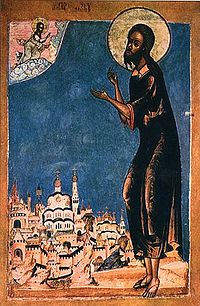Alexius of Rome
| Alexis of Rome | |
|---|---|

Saint Alexius
|
|
| Confessor | |
| Born | 4th Century Rome, Roman Empire |
| Died | 5th Century Rome, Roman Empire |
| Venerated in | Roman Catholic Church; Eastern Orthodox Church; Byzantine Catholic Churches; Syrian Orthodox Church; Armenian Orthodox Church; Maronites; Syriac Catholic Church; Armenian Catholic Church |
| Canonized | Pre-Congregation |
| Feast | 17 July in the West; 17 March in the East |
| Attributes | holding a ladder; man lying beneath a staircase |
| Patronage | Alexians; beggars; belt makers; nurses; pilgrims; travellers |
Saint Alexius or Alexis of Rome or Alexis of Edessa was an Eastern saint whose veneration was later transplanted to Rome. The relocation of the cult to Rome was facilitated by the belief that the saint was a native of Rome and had died there. This Roman connection stemmed from an earlier Syriac legend which recounted that during the episcopate of Bishop Rabbula (412-435) a "Man of God" who lived in Edessa, Mesopotamia as a beggar, and who shared the alms he received with other poor people, was found to be a native of Rome after his death.
The Greek version of his legend made Alexius the only son of Euphemianus, a wealthy Christian Roman of the senatorial class. Alexius fled his arranged marriage to follow his holy vocation. Disguised as a beggar, he lived near Edessa in Syria, accepting alms even from his own household slaves, who had been sent to look for him but did not recognize him, until a miraculous icon of the Blessed Virgin Mary (later this image was called Madonna of St.Alexius) singled him out as a "Man of God."
Fleeing the resultant notoriety, he returned to Rome, so changed that his parents did not recognize him, but as good Christians took him in and sheltered him for seventeen years, which he spent in a dark cubbyhole beneath the stairs, praying and teaching catechism to children. After his death, his family found writings on his body which told them who he was and how he had lived his life of penance from the day of his wedding, for the love of God.
St Alexius' cult developed in Syria and spread throughout the Eastern Roman Empire by the 9th century. Only from the end of the 10th century did his name begin to appear in any liturgical books in the West.
Since before the 8th century, there was on the Aventine in Rome a church that was dedicated to St Boniface. In 972 Pope Benedict VII transferred this almost abandoned church to the exiled Greek metropolitan, Sergius of Damascus. The latter erected beside the church a monastery for Greek and Latin monks, soon made famous for the austere life of its inmates. To the name of St Boniface was now added that of St Alexius as titular saint of the church and monastery known as Santi Bonifacio e Alessio.
...
Wikipedia
